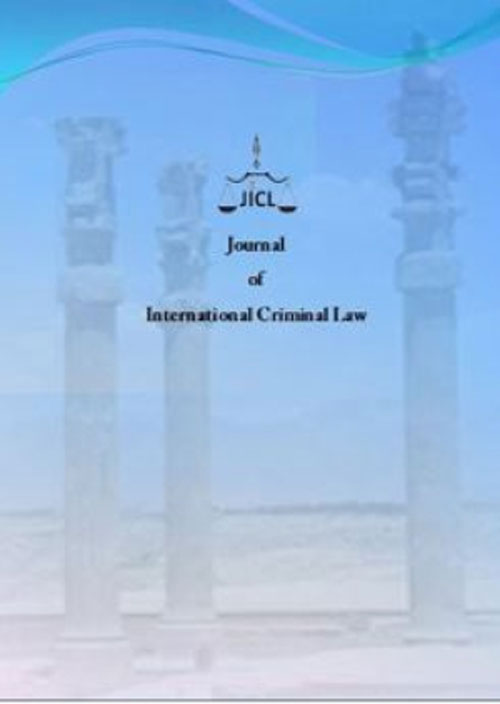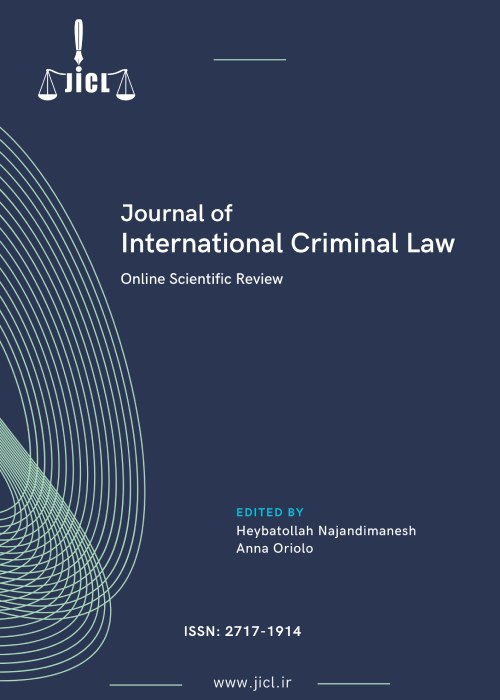فهرست مطالب

Journal of International Criminal Law
Volume:3 Issue: 1, Winter 2022
- تاریخ انتشار: 1400/11/27
- تعداد عناوین: 5
-
Pages 1-9The necessity to establish the Kosovo Specialist Chambers (KSC), a new hybrid tribunal for the crimes committed in Kosovo during and after the NATO intervention, emerged in 2011, when the 'Marty Report' was published. As reported, the crimes concerned especially organ harvesting committed by mid- and senior level Kosovo Liberation Army (KLA) officers. These allegations reversed the national narrative on the Kosovo Albanian's liberation fight against the Serbs, seen no more as oppressors but as victims of the crimes committed by the KLA. Following the 'Marty Report', the international community asked the Government of Kosovo to establish a special court aiming to prosecute individuals responsible for these war crimes. This Court became fully operational in 2017 and immediately, some Albanian politicians tried to revoke it in the Kosovo Assembly. On the contrary, it was welcomed by the international community. These kinds of courts express what we call "transitional justice", a kind of justice entitled to face past large-scale abuses, assure conflict prevention, and achieve reconciliation. Today, the KSC is a very controversial and contested jurisdiction.Keywords: International Criminal Justice, Transitional Justice, hybrid tribunals, Kosovo Specialist Chambers, Kosovo Liberation Army, former Yugoslavia
-
Pages 10-21
Criminal justice is a system of policies and organizations used by national and local governments to maintain social control, prevent and regulate crime, and penalize those who break the law. Law enforcement like- police and prosecutors, courts, defense attorneys, and local jails and prisons are the central agencies charged with these duties, which oversee the procedures for arrest, charging, adjudication, and punishment of those found guilty. The need for criminal justice administration arose from the state's decision to impose the high standard of human conduct required to protect people and communities. It seeks to fulfill its protection goal through enforcement by reducing crime risk and apprehending, prosecuting, convicting, and sentencing those who violate rules and laws promulgated by society. The purposeful administration of criminal justice cannot be effectively implemented without proper orientation at all levels and the coordinated functioning of all three agencies involved in this process, i.e., the police, the criminal courts, and the correctional administration consisting of the prison service, the probation service, and the correctional agencies only when this vital coordination is secured at all stages and at all levels, will it be possible to achieve the real purpose of the crime prevention by the reformation and the rehabilitation of the criminals.
Keywords: Crime, Administration, Protection, Justice, Reformation -
Pages 22-47The establishment of criminal regulations of both substantive and procedural law based on instruments of international law, known as the internationalisation of criminal law, is not a new phenomenon. The novelty of this phenomenon is the scale at which it has spread. It is implemented through various mechanisms, ranging from the cooperation between States, harmonization and approximation, to the integration of various criminal law systems. Harmonization presupposes a mechanism for the interaction of the various criminal law systems; in this sense, harmonization is an imperfect process, as the systems retain some of their differences. International conventions delineate new criminal offenses, commonly called ‘treaty crimes’. In this paper, we propose to look at criminal harmonization via the lens of treaty crimes. Our hypothesis is that the national legislator rarely deviates from the definition provided by the international standard, but does so on occasions where different obligations overlap or in cases of non-mandatory criminalization. To that purpose, we will look at how several international treaties have been applied in Argentine law, as well as how the obligations to criminalize have been implemented.Keywords: International, criminal, Law, treaty, crime, Argentine
-
Pages 48-53The Pre-Trial Chamber of the International Criminal Court issues the decision on the authorization of an investigation into the situation in Bangladesh/Myanmar. In this decision, the Pre-Trial Chamber makes considerable findings regarding the elements of the crime against humanity of deportation. The Chamber states that an element of the crime of deportation is forced displacement across international borders, which means that the conduct related to this crime necessarily takes place in the territories of at least two States and the drafters of the Statutes and the Rules did not limit the crime of deportation from one State Party to another State Party. Also, if at least one legal element of a crime within the jurisdiction of the Court or part of such a crime is committed on the territory of a State Party, the Court has jurisdiction. Thus, acts of deportation initiated in a State not-Party to the Statute (through expulsion or other coercive acts) and completed in a State Party to the Statute (by virtue of victims crossing the border to a State) fall within the parameters of Article 12(2)(a) of the Statute. Further, the Chamber is of the view that deportation is an open-conduct crime, meaning that a perpetrator may commit several different conducts which can amount to expulsion or other coercive acts. Therefore, the various types of conduct may, if established to the relevant threshold, qualify as 'expulsion or other coercive acts' for the crime of deportation, including deprivation of fundamental rights, killing, sexual violence, torture, enforced disappearance, destruction, and looting. In fact, in addition to the use of physical or mental force, other pressures, including the threat of the use of force, can be accepted for committing the crime of deportation, even if individuals are forced to voluntarily leave their homes.Keywords: Deportation, International Criminal Court, Rohingya, Bangladesh, Myanmar
-
Pages 54-93
This article argues that the victim-perpetrator binary to which International Criminal Law (ICL) remains committed is maintained and legitimised by the language of the International Criminal Court (ICC) judgment against Dominic Ongwen, a former child soldier and brigade commander in the Lord’s Resistance Army (LRA). Through minute, delicate choices, the judgment’s language sustains and legitimises a fragile binary upon which its findings depend. Drawing on literary methods of close analysis, and thereby extending possibilities for theorising ICL, I argue that the judgment creates a spiderweb-like structure of descriptions of suffering. Representations of individual testimonies encourage empathy, delineating figures of victims. Such personal testimonies are constantly knotted to a sense of the general, enabling a perception of collective victimhood. Against this spiderweb of victimhood, the court’s language casts one perpetrator. Ongwen stands in contrast, his complexities held at a distance from the reader’s perceptions and empathy. Caught like a fly, Ongwen becomes isolated and entangled within the court’s singular understanding of him. I present the ICC and its modes of operation as a powerful, patient spider, building this web and catching this fly by crafting its own language. Throughout my analysis, I point towards the injustice of the judgment’s tendencies towards unifying victim experiences and separating one perpetrator. These tendencies may reduce the accuracy of ICL’s representations of suffering, obscuring complexity and contradiction. This may limit the ICC’s ability to find and tell truths that reflect the individual experiences of those whose hopes for recovery and reconciliation it wishes to answer.
Keywords: Child Soldiers, close analysis, International Criminal Court, International Criminal Law, Judgment, legitimacy, Lord’s Resistance Army, Ongwen, symbolic prosecution, victim-perpetrator binary


